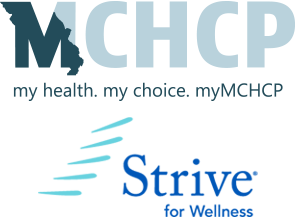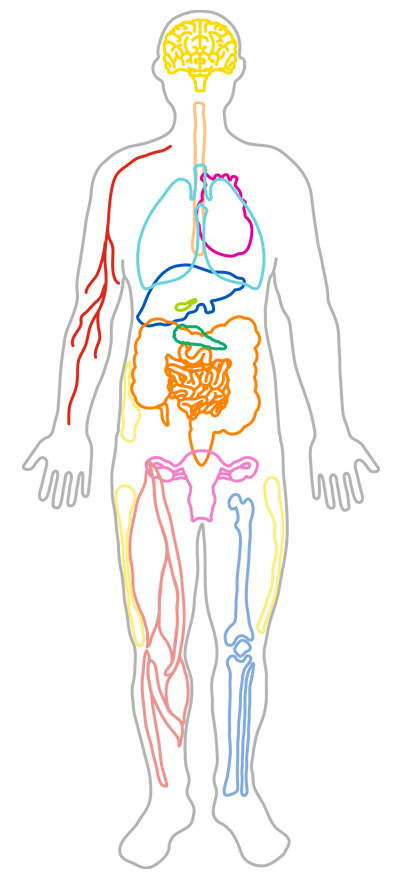



Information provided by Strive for Wellness®
Excess weight affects every part of your body. It is important to maintain a healthy weight to reduce the risk of chronic conditions and death.
Arteries![]()
Inflamed veins
Blood clots
Narrowed or blocked blood vessels from high cholesterol
Lungs![]()
Asthma
Pulmonary blood blots
Liver![]()
Fatty liver
Cirrhosis
Pancreas![]()
Pancreatitis
Prediabetes
Type 2 diabetes
Pancreatic cancer
Muscles![]()
Decreased muscle mass
Increased risk for muscular injury
Fat Cells![]()
Increased number of fat cells
Increased amount of fat near vital organs
Increased Cancer Risks
Breast cancer
Colon cancer
Uterine cancer
Gallbladder cancer
Prostate cancer
Kidney cancer
Esophageal cancer

![]() Brain
Brain
Stroke
Depression
![]() Esophagus
Esophagus
Acid reflux or GERD
Sleep apnea
![]() Heart
Heart
Heart disease
Congestive heart failure
Heart attack
High cholesterol
High triglycerides
High blood pressure
![]() Gallbladder
Gallbladder
Gallbladder disease
Gallstones
Gallbladder cancer
![]() Intestines
Intestines
Colon cancer
![]() Uterus
Uterus
Abnormal periods
Infertility
Uterine cancer
![]() Joints
Joints
Arthritis
Joint pain and swelling
Gout
If you are overweight or obese, begin a discussion with your health care provider about how you can lose weight and reduce your risk.
Questions to ask your provider:
Weight Management Recommendations
Monitor your weight
Weighing yourself regularly can help you keep track of how progress and changes in your lifestyle affect your weight. For accurate weights, weigh at the same time each day.
Keep track of calories
Pay attention to food labels and restaurant calorie information. Restaurant nutrition information can sometimes be found on the menu or on their website. Many smart phone and Web applications are also available to help you count and reduce calories.
Increase activity
While reducing calorie intake and eating healthfully is important for weight loss, individuals who also increase their activity can achieve weight loss results faster, without having to sacrifice as many calories. It is recommended that adults get at least 150 minutes of physical activity each week.
Increase fruits and vegetables
Fruits and vegetables are naturally high in nutrients and low in fat and calories, which can aid in weight loss.
Redefine "snack food"
Snacks do not have to be unhealthy. Reduce the urge to eat tempting treats by stocking up on healthful snacks instead, such as fruits, vegetables, lean proteins, whole grains and nonfat dairy products.
Stay hydrated
Adequate hydration is important for overall health, especially during physical activity when water needs increase due to sweat loss. Staying hydrated can also help reduce overeating.
Other Services Available
Individualized nutritional evaluation and counseling for the management of any medical condition for which appropriate diet and eating habits are essential to the overall treatment program is covered by MCHCP medical plans when ordered by a provider and received through a licensed health care professional (e.g., a registered dietitian).